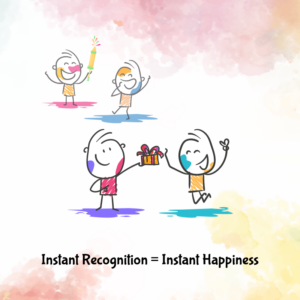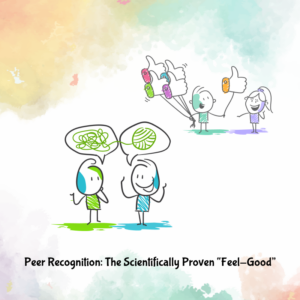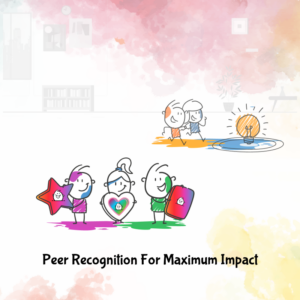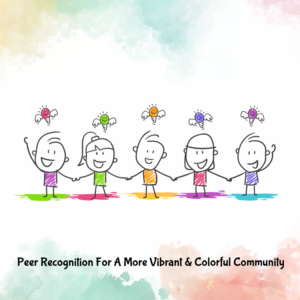Recognition
Bring Color To Life With Peer Recognition Using PeerFives

The Festival of Colors: Holi
Holi is a colorful and joyful festival celebrated annually in India and other parts of the world. People throw brightly colored powders and water at each other during the festival. Globally known for its exuberant use of color, the festival of Holi has a deeper significance which naturally drives over a billion people in India to rejoice and be part of the celebrations. One of the primary reasons why Holi is significant is that it symbolizes the triumph of good over evil. Holi also marks the onset of spring and the end of winter in India. Throwing colored powder and water at one another is a way of welcoming the new season and saying goodbye to the old.
Holi and Peer Recognition?
As a reader interested in learning more about peer recognition, you may wonder why we draw parallels between the Holi festival and peer recognition in this blog.
The answer is straightforward.
Peer recognition is a powerful motivator that, like the festival of Holi, can add color to our lives. But, beyond the bright colors, Holi is a celebration of community, friendship, and the recognition of the bonds that bind us all. The festival of Holi is a metaphor for the power of peer recognition in many ways. Peer recognition is about recognizing the contributions and achievements of those around us, just as the festival is about gathering with friends and family to celebrate our shared humanity.
The Direct Impact Of Peer Recognition:

Peer recognition is an effective tool for increasing morale and motivation, especially in the workplace. We are more likely to be engaged and committed to our work when we feel recognized and appreciated by our peers. We are also more likely to be productive and perform better when we are motivated by a sense of accomplishment and a desire to continue making significant contributions. This is due to the fact that peer recognition is a form of validation that is especially meaningful to us as social beings. Humans are hardwired to seek approval and validation from others, and receiving acknowledgment from our peers satisfies a deep psychological need for social connection and acceptance. It also contributes to our sense of self-worth because we believe those around us value our efforts and contributions.
Peer Recognition and Brain Chemistry:

Festivals such as Holi significantly impact our brain chemistry by triggering the release of various neurotransmitters and hormones in the brain. Peer recognition, too, has been shown to have a similar effect. As a result, receiving praise from their peers uplifts their mood, motivation, and overall well-being. Dopamine is known as the feel-good neurotransmitter as it is linked to feelings of pleasure, reward, and motivation. Dopamine is released in the brain when an individual receives recognition from peers, which can lead to happiness and satisfaction. The excitement and anticipation of attending a festival and the positive experiences we have during the event cause the release of Dopamine.
Oxytocin is another hormone released when we are excited about spending time with friends and family during festivals and when peers recognize an individual. Oxytocin is known as the love hormone as it is linked to social bonding, trust, and empathy. When recognized or rewarded by peers, oxytocin is released in the brain, leading to feelings of social connection and belonging.
Lastly, as we all know, festivals can also have a calming effect on the brain. Cortisol is a stress hormone, and lower levels of it positively impact health and well-being. The feeling of togetherness helps reduce stress and promote a sense of relaxation. Receiving recognition from peers does indeed lead to lower levels of Cortisol.
Impact At The Workplace:

Peer recognition can have a particularly powerful impact in the workplace, where it can foster a culture of positivity and collaboration. Employees are more likely to feel invested in the success of the team as a whole when they feel recognized and appreciated by their peers. As everyone works together towards a common goal, this can foster a sense of camaraderie and shared purpose. Furthermore, peer recognition can aid in removing barriers between individuals and teams, promoting cross-functional collaboration and innovation.
When we recognize the contributions of others, we are more likely to seek opportunities to collaborate with them and learn from their experiences and imbibe their knowledge. This can result in better problem-solving, decision-making, and creative solutions. The power of peer recognition lies not only in the act of recognition itself but also in the way it can spread throughout an organization. Individuals are more likely to recognize and appreciate the contributions of others when they feel recognized and appreciated. This can start a virtuous cycle of positivity and mutual support in which everyone feels empowered to contribute their best work and help their colleagues succeed.
The Parallels

Peer recognition is about building relationships and fostering a sense of connection and belonging, just as Holi is a celebration of community and the bonds that unite us. We strengthen the ties that bind us and create a more vibrant and colorful community when we take the time to acknowledge and appreciate the contributions of those around us. For example, people offer prayers and seek blessings from the Gods during Holi to show their gratitude and respect. Similarly, acknowledging the efforts and contributions of one’s peers can be a way of expressing gratitude and respect for others.
Ultimately, in conclusion, we can express with certainty that Holi festivities and the power of peer recognition share a common theme of adding color and vibrancy to our lives. Both remind us of the value of community, connection, and acknowledging the contributions of others. Likewise, we can create a more positive and supportive workplace culture by embracing the power of peer recognition, where everyone feels valued and empowered to contribute their best work. And, just as the colors of Holi bring color and joy to our surroundings, so can peer recognition bring color and joy to our daily lives.

